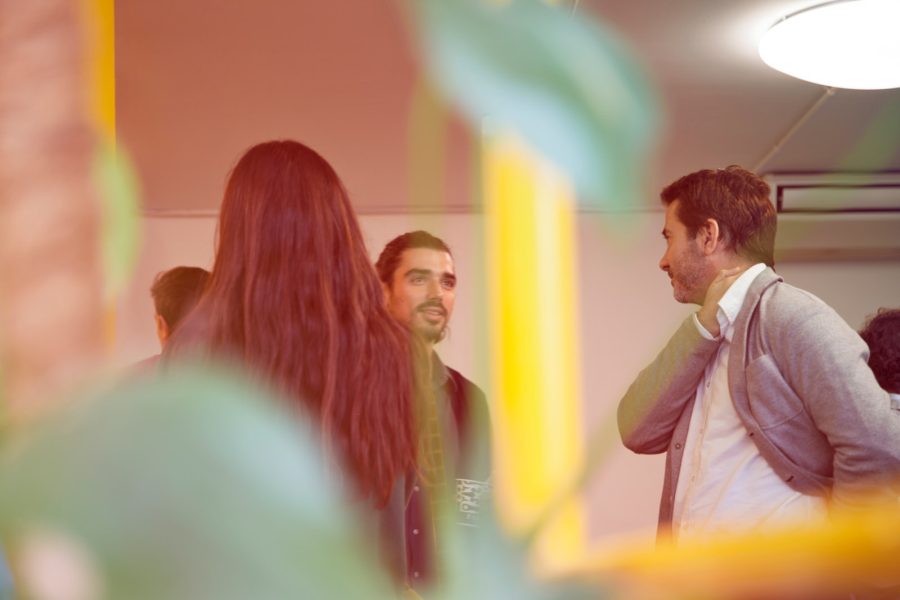As digital copywriters, we spend a lot of our time online.
And I imagine you, like me, land a lot of your clients through online channels. You may even have clients you’ve never met in person — a Zoom meeting is probably as close as you get!
But there’s something to be said for getting in the same room with your prospect, shaking their hand, and listening to their story. It creates a deeper connection faster… and that can lead to your landing projects faster, too.
So, how do you meet face-to-face with more prospects? By attending local events.
And, what do you do once you’re there? Well, we’re going to dig into that today. So, let’s get started!
How to Find Live Events in Your Local Area

The first step to attending local events in your area is to find them. And there are lots of ways to do that.
Your local newspapers are a great place to start. I suggest subscribing to at least one local newspaper for the next month — because valuable information, like upcoming business events, is sometimes available only to paid subscribers.
Pay attention to the business section, both in print and online. Often this section will have a regular calendar giving the date, time, location, and topic of business events happening in your area.
Newspapers are one option. Visiting your local chamber of commerce website regularly is another. I keep an eye on chamber events for my city, but I also watch what’s happening at the chambers in nearby cities, as well. Some chamber events are limited to members only. But others allow anyone to attend, although you may need to pay a fee.
Local events centers are another good place to monitor. They host things like the garden show or the tech show. These are worth attending, especially if they fall within your niche or area of interest. Keep in mind, you can’t actively market yourself at these events unless you get a table (not a terrible idea)… but it’s perfectly acceptable to talk to people, learn about what they do, answer questions they ask you, and then follow up with them later.
Pro Tip: A lot of these events have speakers and would welcome someone who wants to talk about marketing or content or websites for that specific industry. If you’re up for doing a presentation, it’s great exposure and an excellent credibility builder.
You can also look at government organizations, like the Small Business Administration. Sometimes they have local events. They also put on classes for small business owners — another speaking opportunity for you.
Facebook is an excellent place to look for events in your area. Just go to Facebook and put “business events” into the search field. The typical results will feature networking events and business classes coming up in your area. Meetup and EventBrite are other online options for finding live, local events.
I’m always surprised by how much is happening in my area. Not every event is a great fit, but with a little digging, you can easily find one event a month that’s worth your time and energy to attend.
Preparing to Attend a Live Event
Finding live events is the first — and easiest — step.
The next step, and the most overlooked, is preparing in advance of the event.
A lot of folks just put the event on their calendar, show up, and hope for the best. But, if you want to use live events as a marketing strategy, it really pays to put in some time getting ready for the event.
Start by doing some research into who will be at the event. For networking events, you probably won’t turn up much. But, if you’re attending a conference or a trade show, a little research can reveal who’s speaking, which companies are exhibiting, and who the sponsors are for the event. You can pick out a dozen or so companies from that list that you really want to meet. Having that information going in can help you focus your networking efforts while you’re there.
Speaking of focus, I also recommend you give a little thought to what you want to accomplish at the event. It’s useful to set some concrete goals like:
- I want to have five conversations.
- I want to ask eight people about their biggest pain point.
- I want to collect 10 business cards and get permission to follow up.
- I want to come away with two meetings scheduled.
Having a goal in mind makes it easier to work up the courage to open conversations with people. It also gives you an idea of how you want to approach those conversations and what you want to talk about.
Make sure you have what you need in terms of assets ready to go. Take a moment to visit your LinkedIn profile and give it a little finetuning. Have business cards printed if you’ve run out or don’t have them in the first place. If someone asks you about your experience, have a go-to story or two in mind about how you’ve helped past clients.
Finally, take a little time to practice how you’ll answer the inevitable question, “So, what do you do?” Rather than saying, “I’m a copywriter,” try something more conversational like, “I help small businesses get better results from their websites.” I’d also prepare a single offer to focus on for the event. Rather than suggesting you’re a jack of all trades, try saying something like, “I usually start out by helping my clients set up their editorial calendar, so they can get a better handle on their content marketing.” That can help them quickly visualize how you might immediately help their business.
Oh, and I almost forgot about social media. If the event has a social media group tied to it, join up and talk to people in advance. This gives you a chance to get to know some of your fellow attendees, which makes the event more fun and also gives you a great way to start some conversations.
What to Do While You’re There

The moment has arrived. You’re at the event. Now what?
Well… relax, and have fun. Often at these events, it’s best to be social. Enjoy talking to people and hearing about what they do. Ask questions. Listen attentively. Leave any pitching for your follow-up efforts.
Now I can hear you thinking, Sure, talking to people is easy once the conversation gets rolling, but how do I start those conversations?
If you’re an extrovert, that’s easy. You look for someone who isn’t actively engaged in a conversation, and you go up and ask them how they’re doing and if they’re enjoying the event.
If you’re an introvert, I hear you, that approach is a little uncomfortable. In that case, it can help to give yourself a designated role. You could reach out to the event coordinators beforehand and ask if they need volunteers. Maybe they need someone to help check people in. This gives you a chance to introduce yourself to a lot of people and to have little mini-conversations. Then, once the event is in full swing and check-ins are done, you can find someone you’ve already met and talk to them.
If the event doesn’t need volunteers, try turning your efforts into a game. See how many people’s names you can learn in the first half hour of the event. Or hang out by the snacks and make recommendations. Give yourself a point for each time someone takes your snack suggestion. In other words, find a way to make it fun.
Introvert or extrovert, having conversation openers ready can give you more courage to approach people. That way, when you walk up to someone, you already know what you’re going to say. Have two or three opening questions that you like and are comfortable with. “Are you enjoying the event?” is a good one. Or, you could ask something specific about the event. “Do you like the hors d’oeuvres?” is an option. If you’re at an event with speakers, another option is, “Who’s your favorite speaker so far?” You can also ask people what they do and how they came to do it.
As important as having an opening line is, also have an exit line. Something polite and authentic that you can say when the conversation starts to wind down. “I’m just going to pop back over to the buffet,” is good. Or, “If you’ll excuse me, I need to check in with my kids.” Thank whoever you’re talking to for the conversation so far and ask about how to connect later. At the very least, ask if they’re on LinkedIn and how you can find them there. Having an exit line frees you up to diplomatically move onto another conversation, so you can meet as many people as you would like to.
What to Do After the Event
This is where your investment of time and energy really bears fruit.
You go to an event. You meet people. You have conversations. You get to know a little about companies and their pain points and ways you might help.
But then, what do you do with all that?
If you go home and wait by your inbox, refreshing your screen every five minutes hoping someone you met will reach out to you for help, you’re likely going to be disappointed.
You need to be proactive about your follow-up.
Here are three ways to do that…
Connect with people on LinkedIn. Send an invitation to connect to everyone you met at the event. Include a note that mentions you enjoyed talking to them at the event. If you can, include something memorable about your conversation.
Send follow-up emails. For anyone who shared their contact information with you, send them an email and let them know how much you enjoyed talking to them. If they mentioned a pain point you think you can help with, say something about that, like, “You mentioned you weren’t sure how to use content on your website. Content strategy and writing is something I do for clients. If that’s something you’d like to talk more about, we could hop on a call for a half hour of complimentary consulting.” It doesn’t have to be exactly like that, but if you see the opportunity to help them, make the offer to talk about it further.
Keep the conversation going. Once a month or so, reach out to the people you met. Ask them how they’re doing and if they have anything they’re excited about or find particularly challenging. If you have something useful or interesting to share, like an article you wrote or even just one you found, then share it. These regular interactions will keep you top of mind.
You might not land a project out of the gate with your new contacts, but by taking the time to diligently follow up after the event, you can nurture your new connections into full-blown relationships. Will they all convert into clients? Probably not. But your prospects will learn about what you do, how you help businesses, and the value you offer. Then, when they meet someone who needs your help, you’re the one they’ll send them to.
Between new work from these connections and the referrals they send your way, attending live local events can pay off in spades over time.
